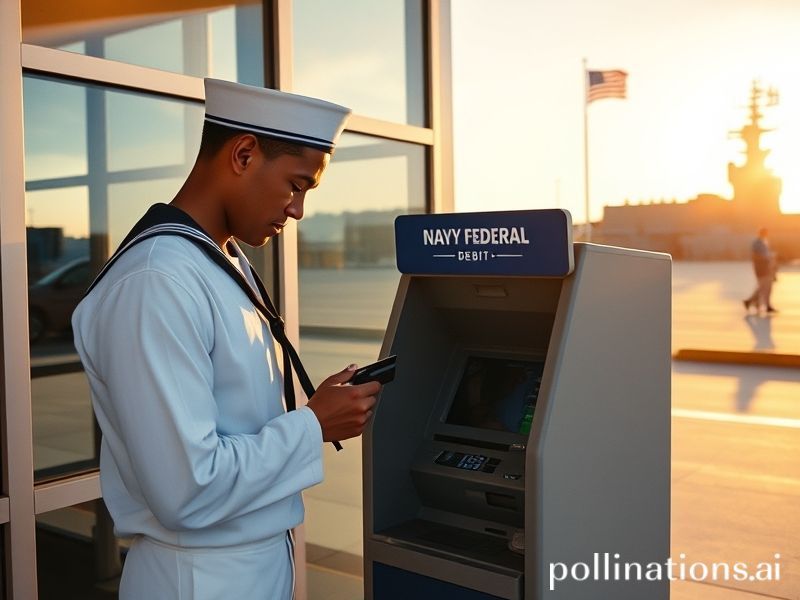Navy Federal: The Virginia Credit Union Quietly Bankrolling Global Power
NAVY FEDERAL: HOW A VIRGINIA CREDIT UNION ACCIDENTALLY BECAME THE WORLD’S MOST POWERFUL SHADOW BANK
By the time the sun reaches the flight deck of the USS Ronald Reagan somewhere in the Philippine Sea, the aircraft carrier’s cash register back home has already processed its first million dollars. The till belongs not to the Pentagon, not to JP Morgan, but to Navy Federal Credit Union—a sleepy-sounding thrift headquartered in a Vienna, Virginia strip mall that, on paper, is the single largest consumer lender on planet Earth. While diplomats in Geneva swap polite fictions about global financial stability, Navy Federal has quietly slipped the leash and is roaming the world like a carrier group that learned to compound interest.
In raw numbers, the credit union serves 13 million members, holds $165 billion in assets, and underwrites one in every four U.S. mortgages issued to active-duty personnel. Translation: it finances the same Marines who will guard next week’s emergency evacuation in Sudan, the same aviators rehearsing Taiwan contingencies, and the same cyber operators already inside Estonian servers “for training purposes.” The institution’s balance sheet is now larger than the GDP of Hungary, which means Budapest can only watch in envy as a suburban American parking lot with a drive-through ATM out-muscles an entire European economy.
The international implications are deliciously ironic. Washington lectures allies on fiscal discipline, yet its own warfighters borrow their grocery money from a cooperative that behaves like a state-subsidized hedge fund. NATO partners dutifully raise defense spending to 2 percent of GDP, blissfully unaware that an additional 0.3 percent is being vacuumed straight back into Navy Federal’s high-yield certificates—an elegant circular flow in which the alliance both funds and is funded by itself. Call it military Keynesianism with direct deposit.
Meanwhile, in host nations from Bahrain to Djibouti, local banks wake each morning to discover that another slice of their dollar deposits has vanished into the NFCU black hole. The credit union’s 345 worldwide branches—some no larger than a shipping container with Wi-Fi—function as soft-power beachheads. Okinawan farmers may distrust American missiles, but they trust the 0.25 percent APR discount on auto loans. Soft power, it turns out, smells faintly of new car scent and gunpowder residue.
The darker joke is that Navy Federal’s meteoric rise tracks precisely the Pentagon’s pivot from boots-on-the-ground to forever-drone. Traditional imperial banks needed vaults and mahogany; this one only needs an app that still works after the local fibre line is severed by, say, an undersea earthquake or a curious Russian trawler. When Kabul fell in 2021, the last outgoing C-17 wasn’t merely lifting refugees—it was also lifting their auto-debts, suspended but not forgiven, somewhere in the cloud over the Hindu Kush.
Regulators in Brussels and Basel have taken notice, but their options are limited. Navy Federal remains technically a credit union, a nonprofit owned by its members, which places it in the same regulatory bucket as your cousin’s organic kombucha startup. Try slapping Basel III capital surcharges on a firm whose board meetings open with the Pledge of Allegiance and close with a prayer for the troops. The optics are worse than sanctioning apple pie.
All of which leaves the global financial system in the surreal position of relying on a glorified piggy bank for the U.S. military to keep dollar liquidity humming from Guam to Grafenwöhr. If Navy Federal ever sneezes—say, if 200,000 sailors refinance en masse to buy GameStop—central bankers everywhere will need more than Kleenex. They’ll need an aircraft carrier, preferably one pre-approved for 1.5 percent cash back.
So the next time you read about great-power competition, spare a thought for the humble teller behind two inches of ballistic glass in a Yokosuka strip mall. She isn’t just counting twenties; she’s balancing the world order, one direct deposit at a time. And should that order collapse, well, at least the overdraft protection is generous. After all, it’s not personal—it’s just naval interest.







